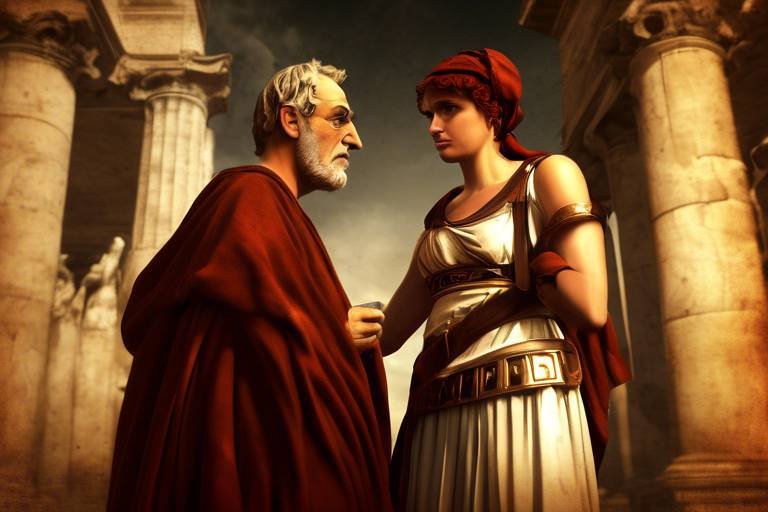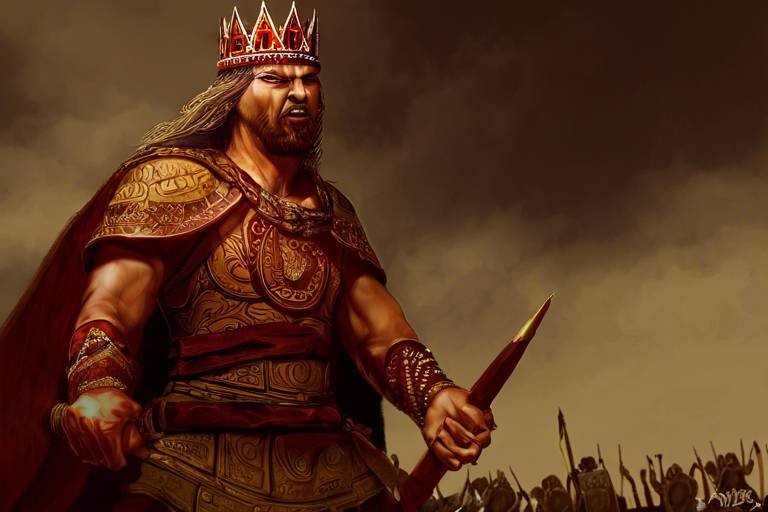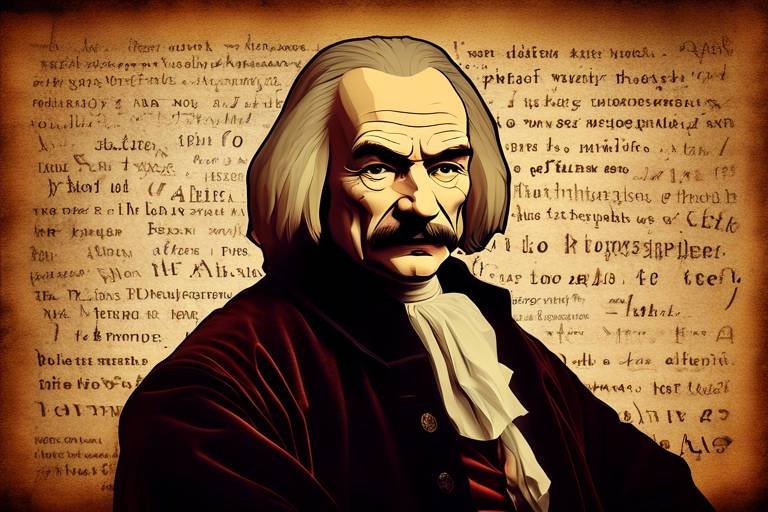Livy: The Historian of Rome
Livy, also known as Titus Livius, stands as a towering figure in the realm of Roman historiography. His meticulous chronicling of Rome's history, spanning from its mythical beginnings to the formative years of the Roman Empire, has left an indelible mark on the study of ancient civilizations. Through his vivid narratives and insightful analysis, Livy has brought to life the triumphs, struggles, and complexities of the Roman people, shaping our understanding of the past and influencing generations of historians and scholars.

Early Life and Background
Let's delve into the fascinating early life and background of Livy, the renowned Roman historian whose works continue to captivate readers centuries later. Titus Livius, known as Livy, was born in Patavium (modern-day Padua) in northern Italy around 59 BC. Growing up in a region known for its rich literary and cultural heritage, Livy was exposed to a diverse range of influences that would later shape his perspective on Roman history.
Despite coming from a non-aristocratic background, Livy received a quality education that emphasized the study of rhetoric, philosophy, and history. His passion for storytelling and keen interest in the past led him to pursue a career as a historian, setting the stage for his future contributions to the field of Roman historiography.
As a young man living during the tumultuous times of the late Roman Republic, Livy witnessed firsthand the political upheavals and social transformations that would define this era. These experiences not only influenced his personal beliefs but also provided him with valuable insights into the complexities of Roman society and governance.

Historiography in Ancient Rome
Historiography in Ancient Rome delves into the rich tapestry of historical writings that emerged during the era of the Roman Empire. In a society where storytelling and documentation held immense value, historians like Livy played a crucial role in shaping the collective memory of Rome. Through their works, these historians not only chronicled the past but also influenced contemporary perceptions and future generations.
Within the realm of ancient Roman historiography, Livy's contributions stand out for their meticulous attention to detail and narrative prowess. His magnum opus, Ab Urbe Condita (From the Founding of the City), is a testament to his dedication to preserving the annals of Rome for posterity. Through a blend of fact and myth, Livy weaves a captivating narrative that captures the essence of Roman identity and values.
One of the defining features of Livy's historiographical approach is his emphasis on moral lessons and the cyclical nature of history. By intertwining political events with ethical considerations, he imparts valuable insights into the consequences of human actions and the virtues of good governance. Through his vivid descriptions and character portrayals, Livy brings the past to life, inviting readers to reflect on the timeless themes of power, ambition, and destiny.
Moreover, Livy's engagement with diverse sources and his critical analysis of conflicting accounts set him apart as a discerning historian. By sifting through varying perspectives and evaluating the reliability of information, he crafts a narrative that is both informative and thought-provoking. His commitment to historical accuracy, coupled with his storytelling flair, ensures that his works endure as enduring classics in the annals of Roman historiography.

Ab Urbe Condita
Livy's monumental work translates to "From the Founding of the City." This extensive historical narrative spans from the legendary origins of Rome to Livy's present time during the early days of the Roman Empire. In this literary masterpiece, Livy meticulously chronicles the evolution of Rome, capturing the essence of its rise to power and the intricate tapestry of events that shaped its destiny.
Structured in a series of books, delves into various aspects of Roman history, including the founding myth of Romulus and Remus, the establishment of the Republic, the Punic Wars, and the transformation of Rome into a dominant imperial force. Through vivid storytelling and detailed accounts, Livy weaves together a narrative that not only informs but also captivates the reader, immersing them in the grandeur and drama of ancient Rome.
Livy's thematic exploration in goes beyond mere historical documentation. He delves into the moral and ethical dimensions of Roman society, highlighting the virtues that uphold a flourishing republic and the vices that lead to its downfall. Through his narrative, Livy imparts timeless lessons on leadership, governance, and the enduring struggle between order and chaos in the annals of history.

From the Founding of the City,
From the Founding of the City, Livy embarked on a monumental journey to chronicle the rich tapestry of Roman history, starting from its legendary origins. This pivotal work, known as Ab Urbe Condita, not only narrated the founding myth of Rome but also delved deep into the early days of the Roman Republic. Livy's narrative skillfully intertwined historical facts with mythical elements, creating a vivid and captivating account that resonated with the Roman populace.

its structure, themes, and impact on Roman historical consciousness.
Livy's monumental work Ab Urbe Condita, also known as From the Founding of the City, stands as a testament to his dedication to chronicling the history of Rome. The structure of this historical masterpiece is meticulously organized, spanning 142 books that cover the legendary origins of Rome to the early days of the Roman Empire. Livy's narrative unfolds with a focus on key events, figures, and societal developments that shaped the trajectory of Rome's history.
Themes woven throughout Ab Urbe Condita delve into the core values and virtues that defined Roman society. Livy skillfully intertwines themes of honor, duty, courage, and the cyclical nature of rise and fall in empires. Through his vivid storytelling, he brings to life the moral dilemmas, political intrigues, and military conquests that shaped the Roman civilization.
The impact of Livy's work on Roman historical consciousness cannot be overstated. By presenting a comprehensive account of Rome's past, Livy not only preserved the collective memory of the Roman people but also shaped their understanding of identity, governance, and societal norms. His portrayal of Rome's triumphs and tribulations served to inspire future generations and instill a sense of pride in their rich heritage.

Style and Narrative Techniques
When delving into Livy's writing style and narrative techniques, one cannot help but be captivated by the masterful way in which he weaves together historical events with compelling storytelling. Livy's approach to recounting the history of Rome is not merely a dry retelling of facts but a vivid tapestry of characters, conflicts, and triumphs that bring the past to life.
One of the key elements of Livy's style is his ability to create a sense of immediacy and drama in his narratives. Through vivid descriptions and emotive language, he transports the reader back in time, allowing them to experience the events as if they were unfolding before their eyes. This immersive quality of his writing is what sets Livy apart as a historian of great skill and artistry.
In terms of narrative techniques, Livy employs a variety of strategies to engage his audience and convey the complexities of Roman history. He skillfully intertwines personal anecdotes, speeches, and dramatic dialogues to provide insight into the motivations and emotions of historical figures. By humanizing the past in this way, Livy creates a connection between the reader and the characters, making the historical events feel relevant and relatable.
Moreover, Livy's meticulous attention to detail and his emphasis on moral lessons and ethical considerations add depth and richness to his narratives. He uses foreshadowing, irony, and rhetorical devices to enhance the dramatic tension and underscore the significance of key moments in Roman history. Through these narrative techniques, Livy not only informs his readers but also challenges them to reflect on the broader themes of power, virtue, and fate.

Political and Social Context
Exploring the life and works of Livy, a prominent Roman historian who chronicled the history of Rome from its legendary origins to the early days of the Roman Empire.
Delving into the political and social environment in which Livy lived and worked provides valuable insights into how his personal beliefs and the prevailing ideologies of his time influenced his portrayal of Roman history. Livy's writings were not only shaped by his own convictions but also by the tumultuous political climate of ancient Rome. The intricate interplay between power dynamics, societal norms, and cultural values colored his narrative of Roman history, offering readers a window into the complexities of governance and social structures in antiquity.

Views on Leadership and Morality
Livy's views on leadership and morality are deeply intertwined with his portrayal of Roman history. Through his works, Livy emphasizes the importance of virtuous leadership in shaping the destiny of Rome. He believed that strong moral values were essential for leaders to guide the Roman state towards prosperity and greatness. Livy's narratives often highlight the consequences of moral failings among leaders, showcasing how individual character traits can impact the course of history.
Moreover, Livy's perspective on leadership goes beyond mere political power; he delves into the ethical responsibilities that come with authority. In his writings, he underscores the significance of moral integrity, justice, and wisdom in governing a society effectively. Livy's ideal leader embodies not only political prowess but also a deep sense of ethical duty towards the people and the state.
When examining Livy's views on morality, it becomes evident that he considered it the foundation of a stable and prosperous society. He believed that moral decay among the populace could lead to the downfall of a civilization, echoing the philosophical debates of his time on the importance of ethics in maintaining social order. Livy's narratives serve as cautionary tales, illustrating the consequences of moral laxity and the virtues that uphold the fabric of a successful society.

Livy's Legacy and Influence
Livy's legacy and influence in the realm of Roman history are profound and far-reaching. His meticulous chronicling of Rome's past, from its legendary beginnings to the early days of the Roman Empire, has left an indelible mark on historical scholarship and popular understanding.
One of Livy's most enduring contributions is his monumental work, Ab Urbe Condita, which translates to From the Founding of the City. This extensive historical narrative not only provides a detailed account of Rome's history but also serves as a cultural and literary treasure trove for scholars and enthusiasts alike. The structure and themes within Ab Urbe Condita continue to shape our perception of ancient Rome and its historical consciousness.
Moreover, Livy's distinctive style and narrative techniques have set a standard for historical storytelling. His adept use of sources, vivid descriptions, and engaging prose have captivated readers for centuries, making his works not just informative but also deeply engaging on a narrative level.
Delving into the political and social context of Livy's time, it becomes evident how his personal beliefs and the prevailing political climate influenced his portrayal of Roman history. Through his writings, Livy offers insights into leadership, morality, and the intricate interplay between individuals and historical events.
The enduring influence of Livy's works can be seen in the continued reverence and study of his texts by historians, scholars, and enthusiasts. His meticulous approach to history and his ability to weave together complex narratives have inspired generations of historians to delve deeper into the annals of ancient Rome.
As modern scholarship continues to grapple with questions of historical accuracy and interpretation, Livy's legacy remains a subject of ongoing debate and fascination. His impact on the study of ancient Rome reverberates through the centuries, ensuring that his name remains synonymous with the rich tapestry of Roman history.

Reception in Modern Scholarship
The reception of Livy's work in modern scholarship has been a subject of intense debate and analysis. Historians and scholars continue to grapple with the question of Livy's historical accuracy and the extent to which his writings reflect the true events of ancient Rome. Some view Livy as a reliable chronicler whose narratives provide valuable insights into Roman society and politics, while others criticize his tendency to embellish or mythologize certain aspects of history for dramatic effect. This dichotomy has led to a nuanced understanding of Livy's legacy, where his contributions are appreciated alongside a critical appraisal of his methods and biases.
Frequently Asked Questions
- What were the major themes covered in Livy's work "Ab Urbe Condita"?
Livy's monumental work "Ab Urbe Condita" delved into various themes such as the founding of Rome, the rise of the Roman Republic, military conquests, political intrigues, and the moral decline of Roman society. His narrative also highlighted the virtues of Roman heroes and the consequences of their actions on the course of history.
- How did Livy's personal beliefs influence his historical writings?
Livy's personal beliefs, shaped by his conservative Roman values, greatly influenced his portrayal of Roman history. He emphasized the importance of virtuous leadership, moral integrity, and the preservation of traditional Roman customs. These beliefs infused his narratives with a sense of moral purpose and served as a guiding principle in his historical accounts.
- What is Livy's legacy and how has it impacted modern scholarship?
Livy's works have left a lasting legacy on the study of Roman history and historiography. His vivid storytelling, moralistic approach, and detailed accounts of Roman events have influenced later historians and scholars. While his historical accuracy has been a subject of debate, Livy's narratives continue to shape our understanding of ancient Rome and inspire further research and interpretation in modern scholarship.



















